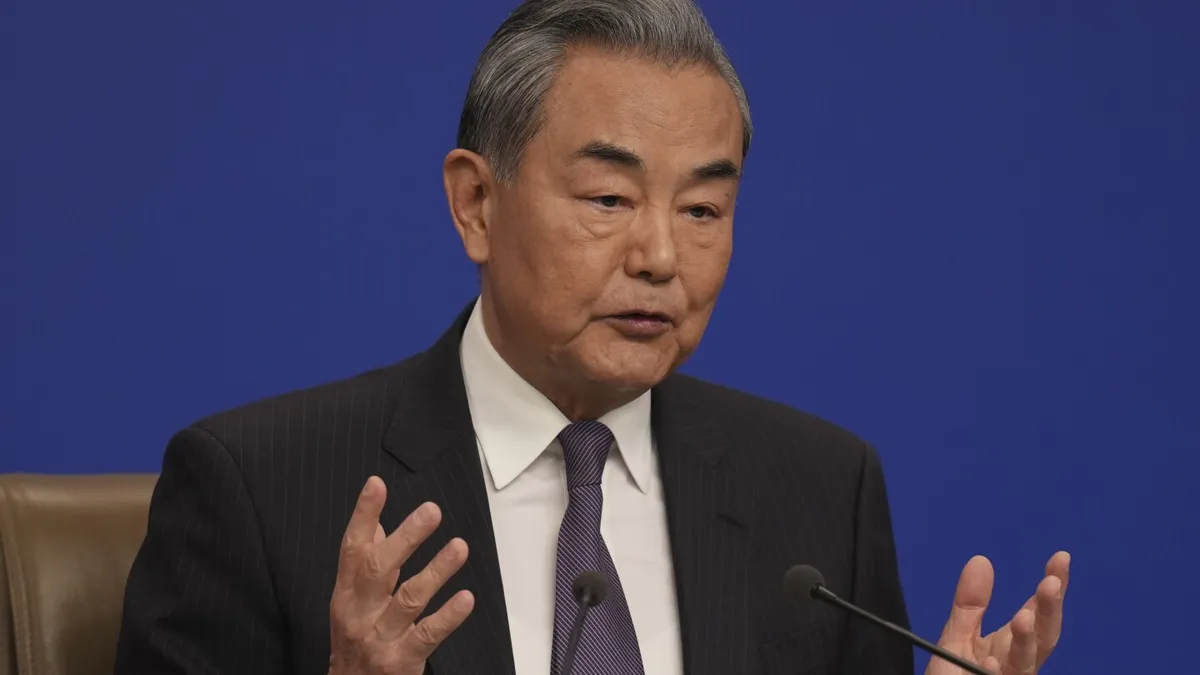
In a recent press conference held on the sidelines of China's annual parliamentary session, Chinese Foreign Minister Wang Yi expressed strong opposition to the United States’ tariffs, describing them as “arbitrary” and asserting that China will continue to retaliate. This statement underscores the escalating tensions between Beijing and Washington, particularly regarding trade and the ongoing fentanyl crisis.
During the press conference, Wang Yi highlighted that China's efforts to assist the U.S. in combating its fentanyl crisis have been met with punitive measures, straining diplomatic ties. He remarked, "No country should fantasize that it can suppress China and maintain a good relationship with China at the same time." This statement reflects a broader sentiment that two-faced actions hinder both bilateral relations and mutual trust.
This week, the U.S. imposed new tariffs on China, Canada, and Mexico, accusing them of fentanyl smuggling. These accusations have been met with strong objections from the affected countries, who label the tariffs as unjustified. Wang Yi emphasized that China has made significant strides in curbing the export of industrial chemicals used to produce fentanyl, arguing that the illegal drug epidemic in the U.S. is a domestic issue, not one caused by China.
The recent duties mark a continuation of the retaliatory tariffs that have characterized U.S.-China relations since the return of President Donald Trump to office in January. The U.S. has raised tariffs on all Chinese imports to 20%, while China has responded with additional 15% tariffs on American goods, including chicken, pork, soy, and beef. Furthermore, China has expanded regulations impacting business operations with key U.S. companies.
Wang Yi's press conference also addressed broader international issues, including the implications of the Trump administration's focus on U.S. interests at the expense of global cooperation. He cautioned that if every country adopted such a policy, it would lead to a "law of the jungle," where smaller nations would suffer the most. Wang called for major countries to fulfill their international obligations and not exploit weaker nations.
On the topic of the ongoing Ukraine war, Wang reiterated China's commitment to resolving the conflict through political dialogues. He reflected on the situation, suggesting that it "could have been avoided" and emphasized the importance of mutual security among nations. Wang also reaffirmed the strength of China-Russia relations, despite recent discussions between the U.S. and Russia regarding the Ukraine situation.
Regarding Taiwan, which China claims as its territory, Wang Yi firmly stated, “Taiwan has never been a country and will never be a country in the future.” He condemned any support for Taiwan's independence as interference in China's internal affairs and warned that such actions could destabilize the Taiwan Strait.
When questioned about former President Trump’s proposal to take control of Gaza and resettle Palestinians, Wang firmly asserted that Gaza belongs to the Palestinians. He warned that any forced changes to the territory's status could lead to further unrest. Wang expressed China's support for the peace efforts of Egypt and other Arab nations, advocating for a two-state solution to the longstanding Israeli-Palestinian conflict.
Wang concluded by noting the ongoing issues surrounding the conflict, stating, “The state of Israel has long been a reality, but the state of Palestine is still far beyond reach.” This statement encapsulates China's position on the need for a balanced approach to resolving one of the most complex geopolitical issues in the region.